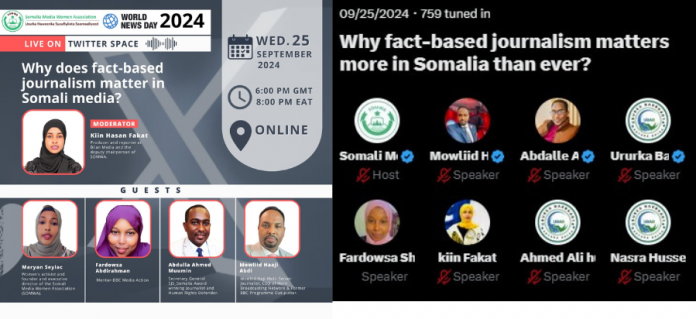In celebration of World News Day, the Somali Media Women Association (SOMWA) hosted a virtual panel discussion highlighting the critical role of fact-based journalism in Somalia. Esteemed speakers included Abdalle Mumin, General Secretary of the Somali Journalists Syndicate (SJS), and Mowliid Haaji Abdi, CEO of Horn Broadcasting Network (HBN) and a former BBC senior journalist. Other notable speakers included Fardowsa Abdirahman, a senior journalist with BBC Media Action, and Maryan Seylac, a women’s rights activist and Executive Director of SOMWA.
This year’s event, which was part of a global effort spanning over 100 countries and hundreds of media organisations, joined forces to highlight the importance of fact-based journalism and the rising threat of misinformation and disinformation displacing credible journalism around the world, including Somalia. As propaganda and biassed news spread, audience trust in fact-based reporting decreased significantly. The panel centred on the importance of accurate journalism for peacebuilding, governance, and transparency in the country.
Countering misinformation in Somalia’s media landscape.
Maryan Seylac opened the discussion by noting that decades of conflict and instability have left Somalia vulnerable to misinformation and propaganda. She stressed that fact-based journalism is a crucial tool in countering false narratives, which often fuel violence, tribalism, and radicalisation. Seylac urged journalists to verify their sources before broadcasting, as this is essential for preventing the spread of harmful misinformation.
Mowliid Haaji Abdi also highlighted the contrast between neutral journalism and opinion- or propaganda-based reporting, warning that many groups, including governments and rebels, manipulate media for political gain. “Journalists must remain neutral to maintain credibility,” Mowliid asserted, adding that many outlets prioritise attention-grabbing content over factual reporting.
Private media interests and public trust
Fardowsa Abdirahman pointed out that most Somali media outlets are privately owned, with owners often prioritising financial gain over journalistic integrity. This practice has eroded public trust in the media, with many turning away from news altogether. However, fact-based journalism plays an essential role in informing the public, she explained, giving the example of timely reporting on natural disasters, which helps communities make informed decisions.
Fact-based journalism and good governance.
The panel also explored how accurate reporting can support Somalia’s democratic process and good governance. Maryan Seylac argued that journalists serve as watchdogs, holding government institutions accountable by exposing corruption, abuse of power, and social issues like unemployment and poor healthcare. This kind of reporting encourages reforms and improved service delivery, ultimately contributing to better governance.
“It may feel impossible now, but it’s necessary to take the steps toward achieving this,” Seylac said, underscoring the importance of fact-based journalism in driving social and political change.
Challenges in verifying information.
Abdalle Mumin emphasised that fairness and accuracy are the cornerstones of responsible journalism, especially in a conflict-ridden country like Somalia. He acknowledged the challenges journalists face in verifying facts, often due to threats and intimidation. Despite these difficulties, he encouraged journalists to remain committed to reporting the truth, no matter how difficult.
Mumin and Mowliid both urged Somali journalists to embrace modern tools and digital platforms in order to advance their skills. Mowliid, reflecting on his long career, noted how the media landscape has evolved, stressing the need for journalists to adapt to today’s digital media environment.
Training and capacity building.
Abdalle Mumin highlighted that while SJS provides timely training to journalists, financial constraints limit the scope of these efforts. Fardowsa Abdirahman concurred, stressing the need for continuous training, especially for young journalists. She also mentioned that BBC Media Action is translating a guide on identifying misinformation and disinformation, which will soon be available in Somali, offering valuable resources for local journalists.
The media’s role in nation-building.
The panel concluded with a message from a Somali youth-led anti-tribalism organisation, calling on the media to help heal the nation and avoid fuelling clan-based conflicts. The speakers concurred that fact-based journalism plays a crucial role in promoting social cohesion and amplifying the voices of marginalised communities.
In closing, the speakers emphasised the need for Somali journalists to remain committed to checking sources, advocating for under-represented voices, and advancing their skills. They called on the Somali government to improve access to information, a crucial component of fact-based journalism that has been lacking for decades.
The discussion underscored the urgent need for credible journalism to build a more transparent and accountable future for Somalia.


